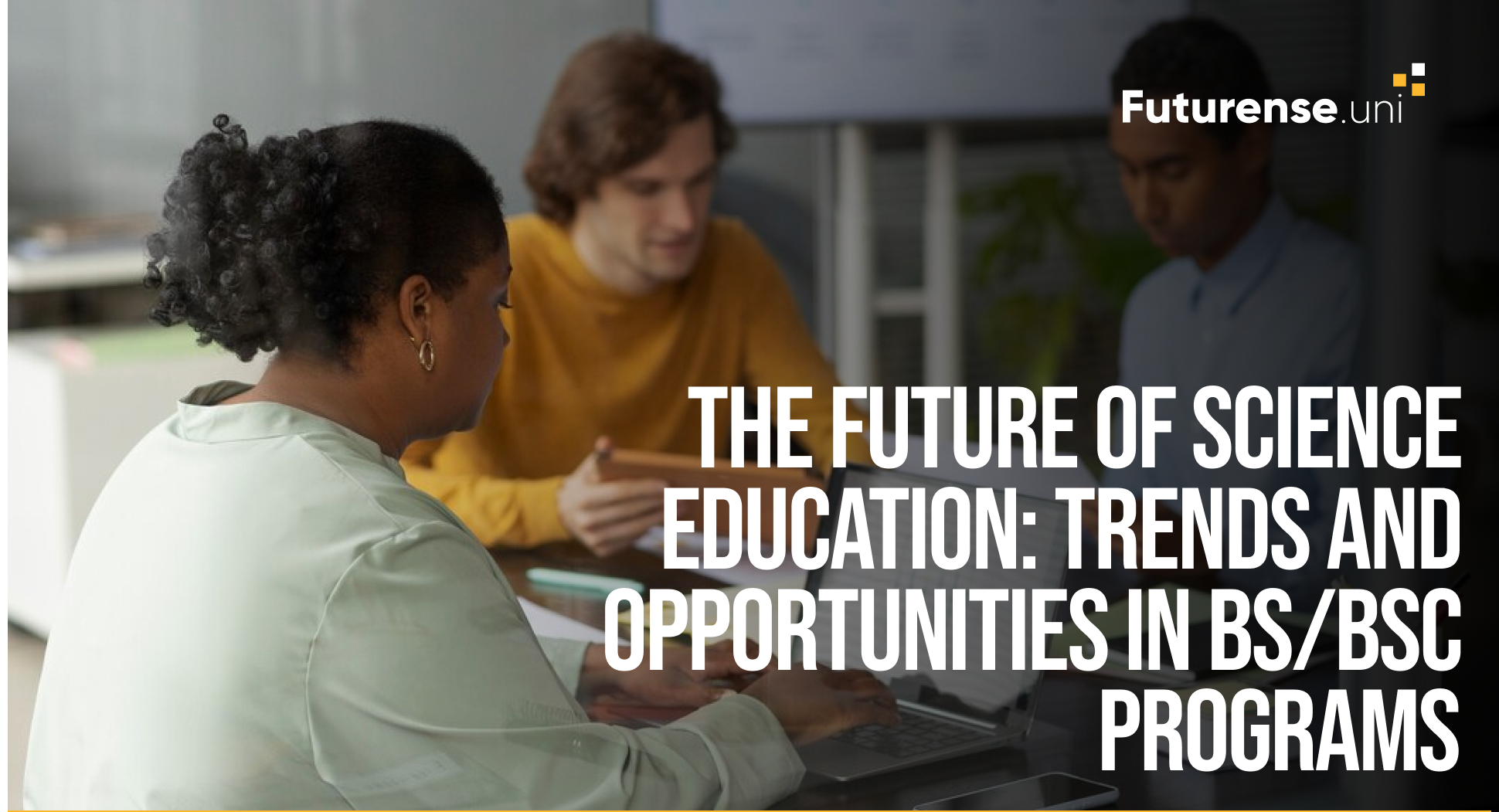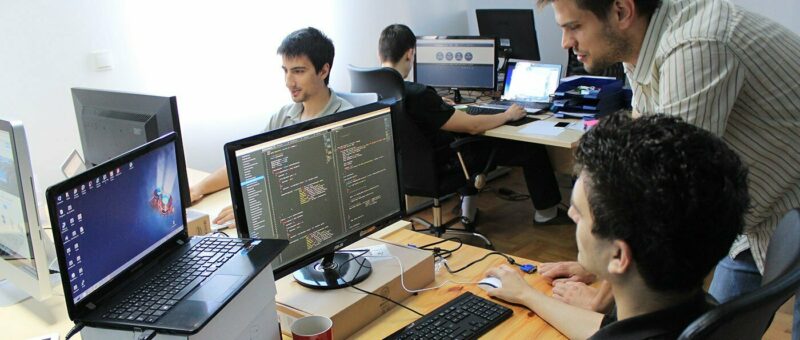The world of science is constantly changing. With new discoveries and technologies, science education must also evolve to prepare students for the future. This is especially true for Bachelor of Science (BS/BSc) programs. These programs are designed to give students the skills they need to succeed in various science fields like biology, chemistry, physics, and more. In recent years, trends and opportunities in science education have been shifting to meet the demands of the modern world.
In this article, we’ll explore how BS/BSc programs are changing, the trends that are shaping the future of science education, and the opportunities available for students who choose these paths.
1. Growing Focus on Technology and Data Science
One of the biggest trends in science education is the growing importance of technology and data science. With the rise of artificial intelligence (AI), machine learning, and big data, science students are now learning how to use technology to solve real-world problems. Many BS/BSc programs are offering courses that focus on data analysis, programming, and the use of advanced technology.
For example, fields like biology and environmental science now involve large amounts of data, and students need to learn how to manage and analyze it. Students who learn data science skills will have more job opportunities, especially in industries like healthcare, technology, and research.
Opportunities:
- Careers in data science, AI, and machine learning.
- Opportunities in healthcare, technology, and research sectors.
- High demand for graduates with strong data analysis skills.
2. Interdisciplinary Programs
Another major trend in science education is the rise of interdisciplinary programs. These programs combine multiple fields of study to provide students with a broader understanding of how science interacts with other areas. For example, a BS/BSc program in environmental science might include courses in economics, policy, and geography. This helps students see the bigger picture and prepares them for more diverse career opportunities.
Interdisciplinary programs are becoming popular because many of today’s problems, like climate change or public health issues, require solutions that cross traditional boundaries. Students with an interdisciplinary background are better prepared to tackle these challenges.
Opportunities:
- Ability to work in diverse fields, from government to private industries.
- Greater flexibility in career choices.
- Skills that are valued in solving complex, real-world problems.
3. Hands-On Learning and Practical Experience
In the past, science education was often focused on classroom learning. Students would listen to lectures, take notes, and read textbooks. However, today’s BS/BSc programs are putting more emphasis on hands-on learning and practical experience. Many programs now include lab work, internships, and real-world projects to help students apply what they have learned in a practical setting.
This trend is important because employers are looking for graduates who not only have theoretical knowledge but also practical experience. By gaining hands-on experience during their studies, students are more prepared for the workforce and can demonstrate their skills to potential employers.
Opportunities:
- Practical experience through internships and lab work.
- Better preparation for the job market.
- Opportunities to work on real-world problems during studies.
4. Online and Hybrid Learning
The COVID-19 pandemic has changed the way education is delivered, and this shift is likely to continue in the future. Many BS/BSc programs are now offering online or hybrid learning options, allowing students to complete some or all of their coursework online. This trend is opening up new opportunities for students who may not have been able to attend traditional, in-person programs due to distance or other constraints.
Online learning also offers more flexibility, allowing students to learn at their own pace. As more universities embrace online education, students will have more choices when it comes to selecting a program that fits their lifestyle and learning preferences.
Opportunities:
- Flexibility to learn from anywhere in the world.
- Access to programs and courses that may not be available locally.
- Opportunities for working professionals to balance education and career.
5. Focus on Sustainability and Environmental Science
Sustainability and environmental science are becoming more important in today’s world, and BS/BSc programs are responding to this trend. Many programs are now offering specialized courses in areas like climate change, renewable energy, and sustainable development. Students who are passionate about the environment can now focus their studies on these critical issues.
As the world looks for ways to combat climate change and protect natural resources, graduates with expertise in environmental science will be in high demand. These fields offer a wide range of career opportunities, from working in government policy to environmental consulting and conservation.
Opportunities:
- Careers in environmental science, conservation, and sustainability.
- Opportunities to work with governments, NGOs, and private companies.
- Involvement in solving some of the world’s biggest challenges.
6. Increased Collaboration with Industry
Another trend in BS/BSc programs is the increased collaboration between universities and industries. Many programs are partnering with companies to offer students opportunities to work on real industry projects, take part in internships, and even secure job placements after graduation.
This collaboration is beneficial for both students and employers. Students get the chance to gain valuable experience and make connections in their field, while companies can help shape the education of future employees and identify potential hires early.
Opportunities:
- Internships and real-world industry projects during studies.
- Better job prospects due to industry connections.
- Opportunities to work directly with companies in various fields.
7. Lifelong Learning and Skill Development
The idea that education ends with a degree is changing. Today’s BS/BSc programs are encouraging students to adopt a mindset of lifelong learning. With the fast pace of technological advancements, it’s important for graduates to continue learning and developing new skills throughout their careers.
Many programs are now offering students access to additional certifications, short courses, and workshops that can help them stay updated with the latest trends and technologies in their field. This focus on continuous learning ensures that graduates remain competitive in the job market.
Opportunities:
- Access to continuous learning resources.
- Ability to stay updated with new trends and technologies.
- Opportunities for career advancement through skill development.
Final Thoughts
The future of science education is bright, with many exciting trends and opportunities emerging for students in BS/BSc programs. From the integration of technology and data science to hands-on learning and interdisciplinary studies, students now have more options than ever to tailor their education to fit their interests and career goals. As science continues to evolve, these programs will play a crucial role in shaping the next generation of scientists, researchers, and innovators.
If you’re considering a BS/BSc program, now is a great time to explore Futurense IIT Jodhpur BS./BSc. in Applied AI and Data Science Program.
Why Choose Futurense BS./BSc. in Applied AI and Data Science Program
- IIT Degree & Prestigious Alumni Status
- Expertise in 100+ AI Tools
- Insights from CXOs, MAANG Leaders & Industry Experts
- Flexible Stackable Degree Model & Direct Pathway to Master’s
The future of science education has something for everyone.
Also, Read: Understanding Outcome-Based Education: A Shift Towards Student-Centered Learning




